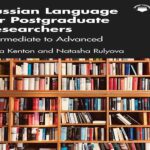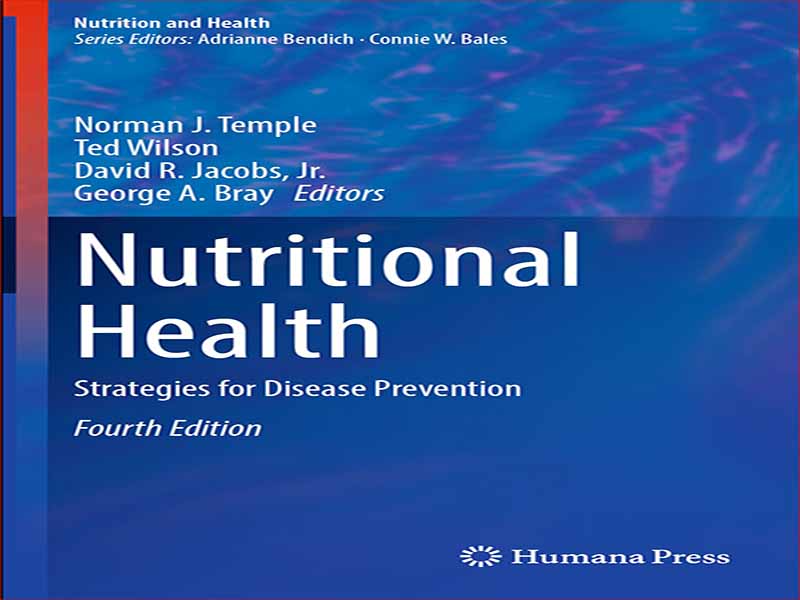- عنوان کتاب: Nutrition and Health Strategies for Disease Prevention
- نویسنده: Adrianne Bendich
- حوزه: تغذیه
- سال انتشار: 2023
- تعداد صفحه: 422
- زبان اصلی: انگلیسی
- نوع فایل: pdf
- حجم فایل: 14.9 مگابایت
علم تغذیه راهی طولانی و پر از دست انداز را طی کرده است. چهار نقل قول زیر این موضوع را نشان می دهد. جرج برنارد شاو میگوید: «هر چیزی که میخورم توسط برخی پزشکان ثابت شده است که سمی کشنده است، و ثابت شده است که هر چیزی که نمیخورم برای زندگی ضروری است. اما من به راهپیمایی ادامه میدهم.» هرمان بوئرهاو (1668-1738) یک پزشک بزرگ هلندی بود. یک داستان این است که او کتابی را به جا گذاشته است که در آن تمام اسرار پزشکی را بیان کرده بود. تمام صفحات کتاب خالی بود به جز صفحه ای که در آن نوشته شده بود: «سر را خنک، پاها را گرم و روده ها را باز نگه دارید». چندی پیش نبود که گیاهخواران به عنوان کرانک دیده می شدند. در اینجا چیزی است که جورج اورول در این مورد در جاده ویگان اسکله، که در سال 1936 نوشته شده است، می گوید: من اینجا دفترچه ای دارم [از یک مدرسه تابستانی سوسیالیستی] که… از من می خواهد بگویم «رژیم غذایی من معمولی است یا گیاهخواری». این را بدیهی می دانند، می بینید که باید این سؤال را پرسید. این نوع چیزها به خودی خود برای بیگانه کردن بسیاری از افراد شایسته کافی است. و غریزه آنها کاملاً صحیح است، زیرا میل غذا طبق تعریف شخصی است که مایل است خود را از جامعه بشری قطع کند به این امید که پنج سال به زندگی لاشه خود بیفزاید. این فردی است که با انسانیت معمولی ارتباط ندارد. دراموند و ویلبراهام در سال 1939 کتاب مهمی تحت عنوان غذای انگلیسی منتشر کردند. جک دراموند در دهه های 1920 و 1930 یکی از مراجع اصلی تغذیه بود. آنها نوشتند: آنقدر تحقیقات دقیق در آزمایشگاه انجام شده است و بررسی های دقیق زیادی انجام شده است که ما همه آنچه را که باید در مورد نیازهای غذایی مردم بدانیم می دانیم …. موقعیت کاملاً واضح است [در رابطه با بریتانیا] . احمقانه است که باور کنیم مردم امروز در پیش بینی های خود دقیق تر از مردم خود هستند. در واقع، انکارناپذیر است که سردرگمی زیادی هم در بین عموم و هم در بین متخصصان بهداشت در مورد اینکه چه چیزی و چه مقدار بخوریم وجود دارد. یک قدم زدن ساده در بخش خودیاری یک کتابفروشی وجود بسیاری از نظرات متفاوت در مورد «تغذیه پیشگیرانه» را تأیید میکند، که بسیاری از آنها بر اساس حقایق و دیگران مبتنی بر حقایق محکم هستند. اولین نسخه بهداشت تغذیه در سال 2001، ویرایش دوم در سال 2006 و ویرایش سوم در سال 2012 منتشر شد. مروری بر علم تغذیه در دهه سوم قرن بیست و یکم نشان می دهد که آب زیادی از زیر پل عبور کرده است. از رودخانه در حال پیشرفت که تحقیق و تمرین تغذیه است. در عین حال، تغییر فرهنگی در سطح جهانی، ملی و منطقهای به این معنی است که عادات تغذیهای ما به تکامل خود ادامه خواهد داد. ما این را به وضوح با تعداد زیادی از غذاهای جدید که به طور مداوم در سوپرمارکت ها ظاهر می شوند، می بینیم. یکی دیگر از شاخصهای سرعت سریع تغییرات، صدها کتاب جدید رژیم غذایی و سلامتی «پیشگام» است که هر سال منتشر میشود. با این انباشته های بزرگ تحولات در در زمینه تغذیه، نیاز به ویرایش جدید این کتاب بدیهی است. در طول قرن گذشته پیشرفت تغذیه، ما اغلب با فرصتهای بزرگی مواجه بودهایم که به طرز درخشانی بهعنوان مشکلات لاینحل پنهان شدهاند. شاید ما مغرض هستیم، اما از نظر ما مشکلات مرتبط با تغذیه از هیجان انگیزترین مشکلات در علوم زیستی است. با پراکنده ای از استثناهای درخشان، تا دهه 1970 تعداد کمی به این ایده توجه جدی داشتند که رژیم غذایی ما نقش مهمی در بیماری های مزمن مانند بیماری قلبی و سرطان ایفا می کند. امروزه، ما درک بسیار بیشتری از نقش رژیم غذایی در بیماری ها داریم. برای مثال، میدانیم که خطر ابتلا به بیماری قلبی، سرطان، چاقی و دیابت نوع 2 تحت تأثیر غذاهایی مانند غلات کامل، میوهها، سبزیجات، انواع گوشتهایی که مصرف میشوند و نوشیدنیهای مصرفشده است. دانش تغذیه بسیار بهبود یافته ما این توانایی را به ما می دهد که از بخش قابل توجهی از بیماری های مزمنی که مردم جهان ما را مبتلا می کنند جلوگیری کنیم، اما تنها در صورتی که این اکتشافات بتوانند به اقدامات مؤثر در سطح جمعیت تبدیل شوند. به قول کنفوسیوس: «ماهیت دانش این است که با کسب آن، باید آن را به کار گرفت.» اما، از قضا، علیرغم شواهد فراوان مبنی بر اینکه تغذیه چنین پتانسیل عظیمی برای بهبود رفاه انسان – با هزینه اندک – دارد، هنوز شکافی بین دانش تغذیه و بهره برداری کامل از آن برای بهبود انسان وجود دارد. سلامت تغذیه تلاش می کند تا نیازهای کسانی را که بیشترین بهره را از اطلاعات به روز در زمینه های کلیدی در زمینه تغذیه می برند، برآورده کند. بر این اساس، این کتاب شامل فصول توسط متخصصان در طیف متنوعی از زمینه های مرتبط با تغذیه است. هدف ما نه آنقدر پوشش دادن تمام لبه های اصلی تغذیه، بلکه بحث در مورد تفکرات و اکتشافات اخیر، به ویژه در رابطه با موضوعاتی است که بیشترین ظرفیت را برای بهبود سلامت انسان و اجرای تغذیه دارند.
Nutrition science has traveled a long and bumpy road. The following four quotes illustrate this.
George Bernard Shaw said “Everything I eat has been proved by some doctor or other to be a deadly poison, and everything I don’t eat has been proved to be indispensable for life. But I go marching on.”
Herman Boerhaave (1668–1738) was a great Dutch physician. One story is that he left a book in which he had set out all the secrets of medicine. All the pages of the book were blank except for the one in which it was written: “Keep the head cool, the feet warm and the bowels open.”
It was not so long ago that vegetarians were seen as cranks. Here is what George Orwell had to say on this in The Road to Wigan Pier, written in 1936:
I have here a prospectus [from a socialist summer school] which… asks me to say ‘whether my diet is ordinary or vegetarian’. They take it for granted, you see, that it is necessary to ask this question. This kind of thing is by itself sufficient to alienate plenty of decent people. And their instinct is perfectly sound, for the food-crank is by definition a person willing to cut himself off from human society in hopes of adding five years on to the life of his carcass; this is a person out of touch with the common humanity.
Drummond and Wilbraham published a seminal book entitled The Englishman’s Food in 1939. Jack Drummond was a major nutrition authority in the 1920s and 1930s. They wrote:
So much precise research has been done in the laboratory and so many precise sur¬veys have been made that we know all we need to know about the food requirements of the people….The position is perfectly clear-cut [with respect to Britain].
It would be foolhardy to believe that people today are more accurate in their predictions than their folks. Indeed, it is undeniable that there is much confusion among both the public and health professionals about what and how much to eat. A simple walk through the self-help section of a book store will confirm the existence of many differing opinions of what “preventive nutrition” is all about, many verging on quackery and others built upon solid facts.
The first edition of Nutritional Health was published in 2001, the second edition in 2006, and the third edition in 2012. An overview of nutrition sci¬ence in the third decade of the twenty-first century reveals that much water has flown under the bridge of the advancing river that is nutrition research and practice. At the same time, cultural change at a global, national, and regional level means that our nutrition habits will continue to evolve. We see this most clearly with the huge numbers of new foods that are continually appearing in supermarkets. Another indicator of the rapid pace of change is the hundreds of new “breakthrough” diet and health books that are published every year. With these large accumulations of developments in
the field of nutrition, the need for a new edition of this book is obvious.
During the last century of nutritional advancement, we have frequently been faced with great opportunities that were brilliantly disguised as insolu¬ble problems. Perhaps we are biased but in our eyes problems associated with nutrition are among the most exciting of those in the life sciences.
With a scattering of brilliant exceptions, until the 1970s few gave serious consideration to the notion that our diet plays an important role in chronic diseases such as heart disease and cancer. Today, we have a vastly greater understanding of the role of diet in disease. We know, for example, that the risk of developing heart disease, cancer, obesity, and type 2 diabetes is affected by foods such as whole grain cereals, fruits, vegetables, the kinds of meats that are eaten, and the beverages consumed.
Our vastly improved nutrition knowledge gives us the capability of pre¬venting a sizable fraction of the chronic diseases that afflict the people of our world, but only if these discoveries can be translated into effective action at the population level. In the words of Confucius: “The essence of knowledge is that, having acquired it, one must apply it.” But, ironically, despite over¬whelming evidence that nutrition has such enormous potential to improve human well-being—at modest cost—there is still a chasm between nutrition knowledge and its full exploitation for human betterment.
Nutritional Health endeavors to address the needs of those who would most benefit from up-to-date information on key areas in the field of nutri¬tion. Accordingly, this book contains chapters by experts in a diverse range of nutrition-related areas. Our aim is not so much to cover all the leading edges of nutrition but rather to discuss recent thinking and discoveries, especially in relation to topics that have the greatest capacity to improve human health and nutritional implementation.
این کتاب را میتوانید از لینک زیر بصورت رایگان دانلود کنید:
Download: Nutrition and Health Strategies for Disease Prevention



































نظرات کاربران